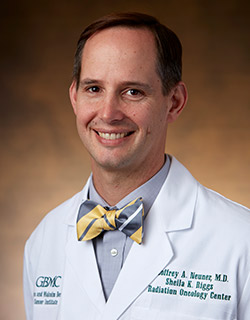Ask an Oncology Expert with Dr. Geoffrey Neuner
September 16, 2021Dr. Geoffrey Neuner gravitated toward radiation oncology at the beginning of his studies because he was able to form meaningful relationships with patients at a critical time in their lives. The ability to make that emotional connection has defined his 10-year career at GBMC.
Dr. Neuner also has a special interest in the latest techniques for treating prostate cancer. He appreciates GBMC’s multidisciplinary approach to patient care because it allows the clinical team to evaluate each patient based on their own unique circumstance.
On September 15, Dr. Neuner answered questions and discussed his recent special interest in treating prostate cancer and GBMC's multidisciplinary approach to patient care.
Three Takeaways
- Depending on a patient's diagnosis and stage of cancer, there could be many reasons to treat with radiation therapy. Radiation can be used as a primary treatment or as an adjuvant treatment to help other treatments (chemotherapy and/or surgery) be more effective.
- There are risk factors when it comes to receiving radiation therapies; however, risks are often low and dependent on where treatment is needed. Many side effects, such as skin and tissue damage, can be treated to be made more tolerable. No matter what, all treatments are discussed in detail with patients before determining the best course of treatment and quality of life.
- Men who are most at risk for prostate cancer are those who have a first degree relative with the same diagnosis. Black men above the age of 45 are most at risk for prostate cancer, followed by white men. Regions are also a factor; men living in North America, Western Europe, and Australia at higher risk than other areas around the world.
The multidisciplinary team at GBMC includes a radiation oncologist, medical oncologist and surgeon who meet regularly to determine the best course of treatment for each individual patient. Once it is determined a patient needs radiation treatment, the Radiation Oncology team works collaboratively to review the course of treatment for each patient.
Dr. Neuner shared there is a never-ending need for donations to the Sandra and Malcolm Berman Cancer Institute, specifically for Oncology Support Services. Transportation is the number one barrier for patients seeking care, and donations help meet their needs in a more effective way. Please consider making a contribution to the Sandra and Malcolm Berman Cancer Institute to support patients' critical needs getting to and from treatment.



